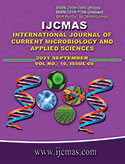


 National Academy of Agricultural Sciences (NAAS)
National Academy of Agricultural Sciences (NAAS)

|
PRINT ISSN : 2319-7692
Online ISSN : 2319-7706 Issues : 12 per year Publisher : Excellent Publishers Email : editorijcmas@gmail.com / submit@ijcmas.com Editor-in-chief: Dr.M.Prakash Index Copernicus ICV 2018: 95.39 NAAS RATING 2020: 5.38 |
Investigation of plants that possess natural antimicrobial substances for plant protection has been recognized as a promising disease management strategy. Alternaria alternata, Fusarium solani, Macrophomina spp., and Pestalotiopsis spp. isolated from diverse hosts such as Azadirachta indica, Melia dubia, Saraca indica and Quercus leucotrichophora produce important diseases in forest nurseries such as leaf blight, leaf spot, and wilt. In this study, botanicals from two invasive plant species, Ageratina adenophora and Ageratum conyzoides, were prepared and tested against plant diseases. Two botanicals (Methanolic extract obtained from the leaves of these two invasive species) and two fungicides were evaluated for their fungal growth inhibitory effects. At 1.5 percent concentration, the methanolic extract of Ageratina adenophora was found highly effective, inhibiting the growth of Macrophomina spp., (71.94%) followed by Pestalotiopsis spp. (70.20%), Alternaria alternate (51.92%) and Fusarium solani (47.03%). Whereas, Systemic chemical fungicide Thiophanate methylat 1.5% concentration showed maximum mycelial growth inhibition of Alternaria alternata (77.20%) and Macrophomina spp. (82.43%) and being deadlier to Pestalotiopsis spp. (100%) and Fusarium solani (100%). Their comparative analysis showed that higher doses of Ageratina adenophora caused either more or almost equal pathogen growth inhibition than lower doses of Chlorothalonil for certain fungi. Thus, promoting eco-friendly disease management strategies such as botanical control would be beneficial in reducing the need for pesticides.
 |
 |
 |
 |
 |